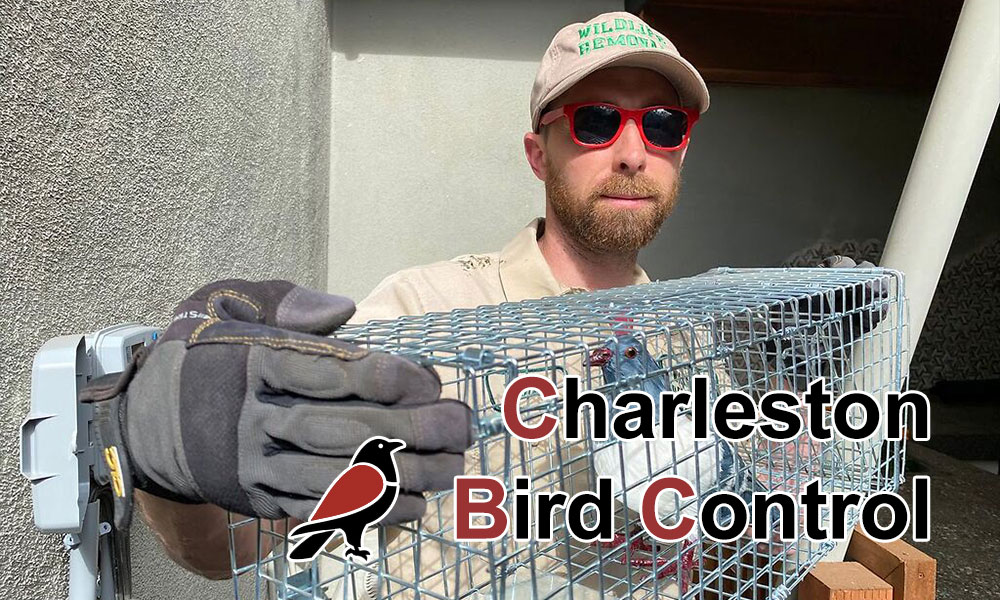
Welcome to Charleston Bird Control: Prevention and Removal of Unwanted Birds
Our company specializes in resolving problems caused by birds in Charleston, South Carolina, both residential and commerical. We handle bird species such as pigeons, starlings, grackles, sparros, and even Canada Geese and woodpeckers. We generally don't kill birds - we prevent them from causing problems. Most commonly, this means that we install barriers that prevent them access to your building or property, or anti-roosting devices that prevent them from landing, nesting, or roosting on your home, store, building, or anywhere. We use netting, needle strips, shock track, and more. We do offer trapping in some cases, and removal of birds from warehouses, grocery stores, or other commerical or industrial buildings by netting or sometimes pellet shooting. We have a wide variety of tools and methods for solving every manner of bird problem. Call us at 843-639-4504 to discuss your bird problem today.Our Work
Full Range of Bird Control ServicesMore About Us Charleston Bird Control:
We have been the leading provider of superior bird control programs for more than 10 years. Our state-authorized technicians are dedicated to delivering the highest level of customer service, engagement, and satisfaction. Our services are available 24/7; we understand how you may need our assistance during off-business hours, or weekends and holidays. We will come to you anytime you need our assistance. Our founders were previous volunteers on a wildlife rescue center. Therefore, we know how valuable it is in keeping the animal safe during the control services. We make sure that we use methods and products that will increase the survivability rate of these animals. We do not use glue traps, toxic chemicals, and poisons. No birds will experience unnecessary pain and suffering during our procedure. If the birds have been abandoned, injured, or sick, they will be surrendered to the nearby wildlife rehabilitation center. We are committed to providing the public with an alternative solution to their urban pest problems. We promise that it will be safe, affordable, and humane. On the off chance that an issue occurred in between our regular service; call us and we will fix the problem free from any forms of charges.How Long Do Pigeons Live?
The pigeon is a bird that is renowned for breeding throughout the year, rather than relying on certain peak breeding seasons. That makes the speed at which these birds reproduce quite staggering, and when you consider that a female pigeon can start to breed at just six or seven months of age (although, usually starts slightly later than that), you can quickly understand why these creatures have been given the nickname "flying vermin". They're not far off rats with wings!
Domesticated/pet pigeons, often used as racing or homing pigeons, can live for many years if their conditions are just right — as many as fifteen years and beyond. To achieve this, the pigeon needs to live in a safe roosting or nesting space that doesn't allow for predatory access, around ten percent of their body weight in food per day, and standing water. The latter is to drink as well as bathe in.
Females usually lay a couple of eggs at a time, but sometimes will lay just one, and at other times will lay three or four. This happens around ten days after breeding. The eggs themselves take a little under three weeks to incubate, and then those squabs — baby pigeons — stay with their mother for around a month or two. In the summer, squabs will leave the nest sooner, but they'll stay for close to three months during the winter when conditions are tough. The mother will usually have laid eggs again before the first round of squabs leave.
In the wild, pigeons do not live for as long, and there are many factors that contribute to this. People are one of the biggest pigeon predators, killing them off for pest control and also hunting them for food and entertainment purposes. The passenger pigeon is one species of pigeon that deforestation and extreme hunting caused the extinction of, and it wouldn't be too unreasonable to think that we could slowly exterminate this pest species to extinction, too. The scenario has happened before.
With people, disease, and predatory attacks on the rise, pigeons are only expected to live for a fraction of their captive lifespan, in the wild. A good life expectancy is three or four years for this bird.
We have the most experience in Charleston at understanding the nuisance birds of South Carolina. Our 7 years of experience in the field ensures excellent results.
We pride ourselves on the quality of our bird control work. Our work is professional grade and long lasting, usually for the life of the building.
We are fully South Carolina licensed. We carry the correct safety equipment, and operate in a safe and professional manner to keep your building and people safe.
Call us at 843-639-4504 to discuss your bird problem and our process. We are always responsive by phone. We can usually schedule next-day appointments, and provide written estimates for all our bird work.
Thank you Charleston Bird Control for keeping the pigeons off of my storefront. My sidewalks are clean now!
These guys were the only ones who could get a sparrow out of my clothing store. Thank you!
Your goose abatement program has kept my golf course dropping-free. I recommend Charleston Bird Control.



